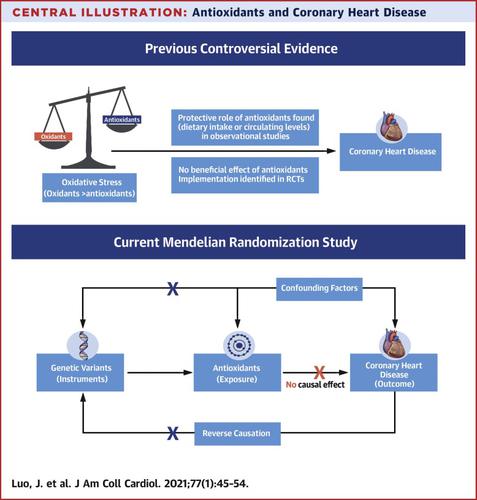当前位置:
X-MOL 学术
›
J. Am. Coll. Cardiol.
›
论文详情
Our official English website, www.x-mol.net, welcomes your
feedback! (Note: you will need to create a separate account there.)
Diet-Derived Circulating Antioxidants and Risk of Coronary Heart Disease
Journal of the American College of Cardiology ( IF 21.7 ) Pub Date : 2021-01-01 , DOI: 10.1016/j.jacc.2020.10.048 Jiao Luo , Saskia le Cessie , Diana van Heemst , Raymond Noordam
Journal of the American College of Cardiology ( IF 21.7 ) Pub Date : 2021-01-01 , DOI: 10.1016/j.jacc.2020.10.048 Jiao Luo , Saskia le Cessie , Diana van Heemst , Raymond Noordam

|
BACKGROUND
Previously, observational studies have identified associations between higher levels of dietary-derived antioxidants and lower risk of coronary heart disease (CHD), whereas randomized clinical trials showed no reduction in CHD risk following antioxidant supplementation. OBJECTIVES
The purpose of this study was to investigate possible causal associations between dietary-derived circulating antioxidants and primary CHD risk using 2-sample Mendelian randomization (MR). METHODS
Single-nucleotide polymorphisms for circulating antioxidants (vitamins E and C, retinol, β-carotene, and lycopene), assessed as absolute levels and metabolites, were retrieved from the published data and were used as genetic instrumental variables. Summary statistics for gene-CHD associations were obtained from 3 databases: the CARDIoGRAMplusC4D consortium (60,801 cases; 123,504 control subjects), UK Biobank (25,306 cases; 462,011 control subjects), and FinnGen study (7,123 cases; 89,376 control subjects). For each exposure, MR analyses were performed per outcome database and were subsequently meta-analyzed. RESULTS
Among an analytic sample of 768,121 individuals (93,230 cases), genetically predicted circulating antioxidants were not causally associated with CHD risk. For absolute antioxidants, the odds ratio for CHD ranged between 0.94 (95% confidence interval [CI]: 0.63 to 1.41) for retinol and 1.03 (95% CI: 0.97 to 1.10) for β-carotene per unit increase in ln-transformed antioxidant values. For metabolites, the odds ratio ranged between 0.93 (95% CI: 0.82 to 1.06) for γ-tocopherol and 1.01 (95% CI: 0.95 to 1.08) for ascorbate per 10-fold increase in metabolite levels. CONCLUSIONS
Evidence from our study did not support a protective effect of genetic predisposition to high dietary-derived antioxidant levels on CHD risk. Therefore, it is unlikely that taking antioxidants to increase blood antioxidants levels will have a clinical benefit for the prevention of primary CHD.
中文翻译:

饮食来源的循环抗氧化剂和冠心病的风险
背景 此前,观察性研究已经确定了较高水平的膳食衍生抗氧化剂与较低的冠心病 (CHD) 风险之间的关联,而随机临床试验表明,补充抗氧化剂后冠心病风险并未降低。目的 本研究的目的是使用 2 样本孟德尔随机化 (MR) 来研究膳食来源的循环抗氧化剂与原发性 CHD 风险之间可能存在的因果关系。方法 从已发表的数据中检索循环抗氧化剂(维生素 E 和 C、视黄醇、β-胡萝卜素和番茄红素)的单核苷酸多态性,评估为绝对水平和代谢物,并用作遗传工具变量。基因-CHD 关联的汇总统计数据来自 3 个数据库:CARDIoGRAMplusC4D 联盟 (60, 801例;123,504 名对照受试者)、英国生物银行(25,306 例;462,011 例对照受试者)和 FinnGen 研究(7,123 例;89,376 例对照受试者)。对于每次暴露,根据结果数据库进行 MR 分析,并随后进行荟萃分析。结果 在 768,121 个人(93,230 例)的分析样本中,遗传预测的循环抗氧化剂与 CHD 风险没有因果关系。对于绝对抗氧化剂,每增加一个 ln 转化的抗氧化剂,CHD 的优势比范围介于 0.94(95% 置信区间 [CI]:0.63 至 1.41)(视黄醇)和 1.03(95% CI:0.97 至 1.10)β-胡萝卜素之间值。对于代谢物,代谢物水平每增加 10 倍,γ-生育酚的优势比介于 0.93(95% CI:0.82 至 1.06)和抗坏血酸的 1.01(95% CI:0.95 至 1.08)之间。结论 我们研究的证据不支持遗传易感性对高膳食来源抗氧化水平对冠心病风险的保护作用。因此,服用抗氧化剂来增加血液抗氧化剂水平不太可能对预防原发性冠心病有临床益处。
更新日期:2021-01-01
中文翻译:

饮食来源的循环抗氧化剂和冠心病的风险
背景 此前,观察性研究已经确定了较高水平的膳食衍生抗氧化剂与较低的冠心病 (CHD) 风险之间的关联,而随机临床试验表明,补充抗氧化剂后冠心病风险并未降低。目的 本研究的目的是使用 2 样本孟德尔随机化 (MR) 来研究膳食来源的循环抗氧化剂与原发性 CHD 风险之间可能存在的因果关系。方法 从已发表的数据中检索循环抗氧化剂(维生素 E 和 C、视黄醇、β-胡萝卜素和番茄红素)的单核苷酸多态性,评估为绝对水平和代谢物,并用作遗传工具变量。基因-CHD 关联的汇总统计数据来自 3 个数据库:CARDIoGRAMplusC4D 联盟 (60, 801例;123,504 名对照受试者)、英国生物银行(25,306 例;462,011 例对照受试者)和 FinnGen 研究(7,123 例;89,376 例对照受试者)。对于每次暴露,根据结果数据库进行 MR 分析,并随后进行荟萃分析。结果 在 768,121 个人(93,230 例)的分析样本中,遗传预测的循环抗氧化剂与 CHD 风险没有因果关系。对于绝对抗氧化剂,每增加一个 ln 转化的抗氧化剂,CHD 的优势比范围介于 0.94(95% 置信区间 [CI]:0.63 至 1.41)(视黄醇)和 1.03(95% CI:0.97 至 1.10)β-胡萝卜素之间值。对于代谢物,代谢物水平每增加 10 倍,γ-生育酚的优势比介于 0.93(95% CI:0.82 至 1.06)和抗坏血酸的 1.01(95% CI:0.95 至 1.08)之间。结论 我们研究的证据不支持遗传易感性对高膳食来源抗氧化水平对冠心病风险的保护作用。因此,服用抗氧化剂来增加血液抗氧化剂水平不太可能对预防原发性冠心病有临床益处。










































 京公网安备 11010802027423号
京公网安备 11010802027423号